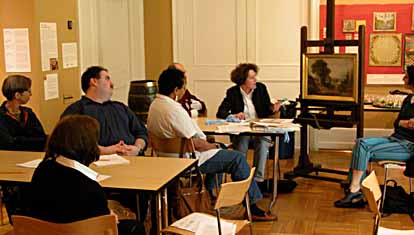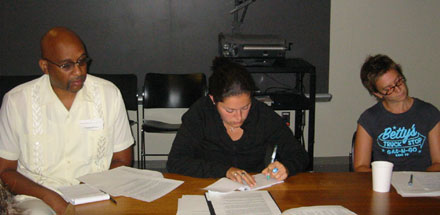September 2003
Learning To Look Summer Institutes
This summer, ASHP/CML’s longstanding teaching with technology program, the New Media Classroom (NMC), conducted week-long institutes for our latest faculty development initiative, Learning to Look: Visual Evidence and the U.S. Past in the New Media Classroom.

The Learning to Look (LtL) institutes which took place at Miillersville University (PA); Washington State University (WA); Assumption College (MA); CUNY’s Graduate Center and City College Center for Worker Education (NY); Spelman College (GA); Dillard University (LA); Maryville College (TN); and Mott Community College and Middle College HS (MI), provided participating faculty with access to new scholarship in the field of U.S. history and American studies using visual evidence as a means to study the past. Featuring humanities educators from high school and college classrooms, along with museum and historical archive professionals, the goal of each institute centered on building successful strategies for interpreting and critically evaluating visual resources for effective interdisciplinary teaching and learning.
Using a wide range of new media teaching resources in American history, art history, and literature, each institute addressed various topics and themes in the U.S. past, including African-American culture, regional history, the Interwar Years and the changing nature of American visual culture, and working class history. The institutes featured such curricular resources as the newly launched Learner Guides from the History Matters Web site, which help students analyze and interpret photographs, advertisements, films, and other forms of primary evidence; Fotonotes, an online “seeing and writing” tool; and classroom-tested inquiry learning activities using image archives found on the Web.
Guest presenters were drawn from academic programs and institutions located on NMC-LtL host campuses, including schools of education, humanities departments (history, art history, visual studies, American literature), local museums and historical archives, and campus-based media and learning centers.
The Learning to Look summer institutes included programming from our three new Regional Centers: Spelman College (GA); the CUNY Center for Worker Education (NY); and Dillard University (LA).
For further information on the Learning to Look faculty development program and our yearlong activities, contact Donna Thompson Ray at: DThompson@gc.cuny.edu.
Library of Congress Acquires The September 11 Digital Archive
The Library of Congress will mark its first major digital acquisition of September 11, 2001, materials with the addition to its collections of The September 11 Digital Archive. The Digital Archive is a joint project of the American Social History Project/Center for Media and Learning and George Mason University’s Center for History and New Media – two organizations that have explored digital history for more than a decade.
On Sept. 10, 2003 the Library of Congress will formally accept the material, which contains more than 135,000 written accounts, e-mails, audio recordings, video clips, photographs, Web sites and other digital materials that document the attacks on New York City, Washington, D.C., and western Pennsylvania and their aftermath. These items will provide researchers with a major source of information about the attacks. “Even in the midst of the initial chaos of the horrific events of September 11, 2001, the Library of Congress began collecting materials documenting the attacks,” said Diane Kresh, director of the Library’s Public Service Collections. “Since that time, the Library has been amassing material through its public service divisions and overseas offices. This September 11 Digital Archive, with its vast content of firsthand accounts, will add to the broad range and diversity of materials already acquired by the Library of Congress that relate to the September 11 tragedy.”
These digital materials offer a wide spectrum of opinions and perspectives, ranging from recordings of Manhattan residents’ voicemails on the morning of September 11 to drawings by children from Los Angeles depicting the attacks. “As with other collective historical events,” said Eric Foner, Columbia University DeWitt Clinton Professor of History, “the memory of September 11 will be an essential part of historical understanding in the future. By preserving the raw material of history — which now includes evidence recorded in digital form — The September 11 Digital Archive will help contribute to subsequent generations’ understanding of the past and, therefore, of themselves.”
The Archive is the largest digital collection of September 11-related materials, serving as the Smithsonian Institution’s designated repository for digital objects related to the attacks. The availability of these materials in the Library of Congress will prove invaluable to future historians and researchers.
To mark the acquisition of The Digital Archive, the Library of Congress will host a daylong symposium, “September 11 as History: Collecting Today for Tomorrow.” The event, which will take place in the Library’s Coolidge Auditorium on September 10, will feature commentary by leading U.S. historians, librarians, and archivists, including Ronald Walters, University of Maryland, and Michael Kazin, Georgetown University. Kazin’s keynote address is “12/12 and 9/11: Tales of Power and Tales of Experience in Contemporary History.”
New York Community Trust Awards ASHP/CML Grant To Work With New Small Schools
The New York Community Trust awarded ASHP/CML a $60,000 grant in support of a two-year education program. The grant provides partial funding for a partnership between ASHP/CML and a consortium of eight new small theme-based schools in the Bronx, New York. ASHP/CML will provide sustained professional and curriculum development support to participating humanities teachers.
ASHP/CML Holds Teacher Institutes for New Small Schools
With support from JPMorganChase, ASHP/CML conducted a two-day teacher institute on August 25th and 26th at the CUNY Graduate Center. Focusing on Slavery and Reconstruction, hands-on workshops provided participating faculty with rich social history content and innovative teaching strategies.

Using ASHP/CML curriculum materials, sample sessions included an activity analyzing the nature and meaning of slave resistance using the video, Doing As They Can: Slave Life in the American South; a visual literacy exercise investigated the Eastman Johnson painting, A Ride for Liberty; and participants surveyed the History Matters Web site. English and social studies teachers commented on the value of ASHP/CML resources in enhancing their curriculum.
The Chinatown Documentation Project

In collaboration with The Museum of Chinese in the Americas, the Columbia University Oral History Research Office, and New York University’s Asian/Pacific/American Studies Program and Institute, ASHP/CML has received a $150,000 grant from the Rockefeller Foundation for The Chinatown Documentation Project (CDP).
The CDP aims, through facilitated dialogues and recorded oral histories, to foster thoughtful community conversations and reflections on the consequences of September 11 for Chinatown and its residents. The CDP will present these dialogues and oral histories over the Internet so that they might serve as a resource for the community’s articulation of its identity and defining of its future.
The gathered materials will extend the mission of The September 11 Digital Archive and enrich its already broad collection. For further information on the Chinatown Documentation Project, contact Fritz Umbach at: ghu1@cornell.edu.
Calendar: “Talking History” Online Forum from History Matters
http://historymatters.gmu.edu/browse/talkhist/
October 2003 — Teaching the Civil Rights Movement with Charles Payne (Duke University) as Guest Moderator
This month-long online discussion will focus on teaching the Civil Rights Movement in high school and college U.S. History survey courses. Teachers, students, and all interested in the history of the Civil Rights Movement can subscribe by going to ashp.listserv.cuny.edu/archives/civilrights.html.
Calendar: ASHP/CML Seminar
Schools in Crisis?: Historical Perspectives on City School Reform
Tuesday October 14, 6-8pm, The Graduate Center
This free public event, sponsored by ASHP/CML and The Graduate Center’s Continuing Education Program, will bring together historians and activists to discuss the current dilemmas facing urban education, their historical origins, and their potential remedies. Panelists include: Adina Back, Visiting Fellow, New York University Institute for Education and Social Policy; John Spencer, Assistant Professor of Education, Rowan University; an invited representative of the Campaign for Fiscal Equity, a coalition of parent organizations, community school boards, concerned citizens and advocacy groups that seeks to reform New York State’s school finance system to ensure adequate resources and the opportunity for a sound basic education for all students in New York City; and Jean Anyon, Professor of Urban Education, The Graduate Center, CUNY, and author of Ghetto Schooling: A Political Economy of Urban Educational Reform.
